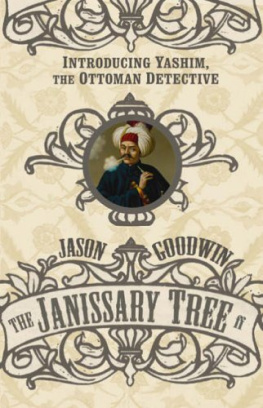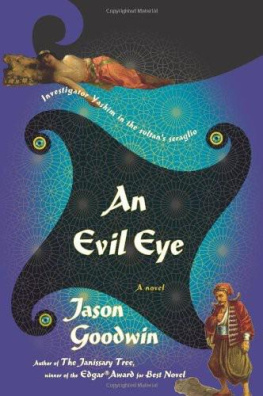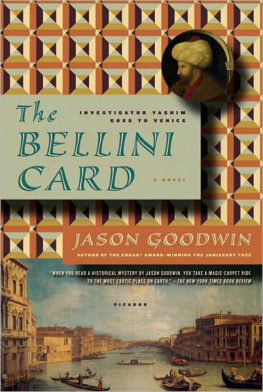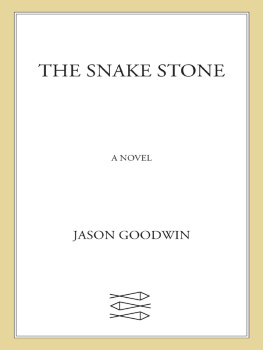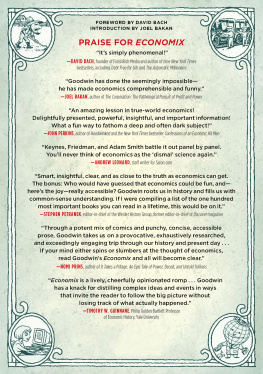Jason Goodwin - The Bellini card
Here you can read online Jason Goodwin - The Bellini card full text of the book (entire story) in english for free. Download pdf and epub, get meaning, cover and reviews about this ebook. genre: Detective and thriller. Description of the work, (preface) as well as reviews are available. Best literature library LitArk.com created for fans of good reading and offers a wide selection of genres:
Romance novel
Science fiction
Adventure
Detective
Science
History
Home and family
Prose
Art
Politics
Computer
Non-fiction
Religion
Business
Children
Humor
Choose a favorite category and find really read worthwhile books. Enjoy immersion in the world of imagination, feel the emotions of the characters or learn something new for yourself, make an fascinating discovery.

- Book:The Bellini card
- Author:
- Genre:
- Rating:3 / 5
- Favourites:Add to favourites
- Your mark:
- 60
- 1
- 2
- 3
- 4
- 5
The Bellini card: summary, description and annotation
We offer to read an annotation, description, summary or preface (depends on what the author of the book "The Bellini card" wrote himself). If you haven't found the necessary information about the book — write in the comments, we will try to find it.
The Bellini card — read online for free the complete book (whole text) full work
Below is the text of the book, divided by pages. System saving the place of the last page read, allows you to conveniently read the book "The Bellini card" online for free, without having to search again every time where you left off. Put a bookmark, and you can go to the page where you finished reading at any time.
Font size:
Interval:
Bookmark:
Jason Goodwin
The Bellini card
1
He sank slowly through the dark water, arms out, feet pointed: like a Christ, or a dervish, casting a benediction on the sea.
The stone at his feet hit the mud with a soft explosion, his knees buckled, and in a moment he was bowing gracefully with the tide. He had always been graceful, pliant, too, when fixing a price, a man who traded and left something in the deal for the other fellow.
Overhead, the killer turned his head from side to side, alert to the slightest motion in the darkness, feeling the rain on his face. He stood for a few minutes, waiting and watching, before he blinked, turned, and padded softly from the bridge, to be swallowed up by the night and the alleyways of the sleeping city.
The tide ebbed. The water sucked at the green weed that lined the walls, gurgled around old pilings, and slipped and receded from worn stone steps. It sank, nudging the trader closer to the sea on which, in her days of glory, the city had made her fortune. Beneath Byzantine domes, dilapidated palaces, and tethered boats the corpse was hustled noiselessly toward the sea, arms still flung wide in a gesture of vacant welcome.
Yet some obstruction, a block of stone or loop of rotten rope, must have checked his passage for a time, for when dawn broke, and the tide slackened, the trader was still yards away from the deep waters of the Riva dei Schiavoni into which he would have otherwise sunk without further trace.
2
The sultan gave a high-pitched sneeze and patted his face with a silk handkerchief.
The Queen of England has one, he said petulantly.
Resid Pasha bowed his head. King William was dead, like Sultan Mahmut. Now, he thought, England and the Ottoman Empire were being ruled by little girls.
As the sultan says, may his days be lengthened.
The Habsburgs have several galleries, I understand. In their dominions in Italy, whole palaces are stuffed with pictures. The sultan dabbed at his nose. The Emperor of Austria knows what his grandfathers grandfather was like by looking at his picture, Resid Pasha.
The young pasha folded his slender hands in front of him. What the sultan said was true but perfectly ridiculous: the Habsburgs were notoriously ugly, notoriously alike. They married their close relations, and the chins got bigger every generation. Whereas an Ottoman prince had none but lovely and accomplished women to share his bed.
Resid Pasha tensed his shoulders. The Austrian dogs always piss on the same spot, he said with a jocular grunt. Who would want to see that?
Even as he spoke, he knew he had made a mistake. Sultan Mahmut would have grinned at the remark, but Mahmut was dead.
The sultan frowned. We are not speaking of dogs now.
You are right, my padishah. Resid Pasha hung his head.
I speak of the Conqueror, Abdulmecid said loftily. Of the blood in these veins. He held out his wrists, and the young counselor bowed, abashed.
If the picture exists, I wish for it, the sultan continued. I want to see it. Do you desire, Resid Pasha, that the likeness of the Conqueror should be exposed to the infidel gaze, or that an unbeliever should possess it?
Resid Pasha sighed. And yet, my sultan, we do not know where the painting might be. If, indeed, it exists at all.
The young padishah sneezed again. While he examined his handkerchief, the pasha pressed on: For more than three centuries, nobody ever saw or heard about this-picture. Today we have a rumor, nothing more. Let us be cautious, my padishah. What does it matter if we wait another month? Another year? Truth is like musk, whose grateful odor can never be concealed.
The sultan nodded, but not in agreement. There is a faster way, he said, in a voice treacled with mucus.
Send for Yashim.
3
Close to the shoreline of the Golden Horn, on the Pera side, stood a fountain set up by an Ottoman princess as an act of generosity, on a spot where the boatmen used to linger and drop their fares. Hundreds of fountains existed in the streets and squares of Istanbul, but this one was particularly old and lovely, and Yashim had admired it many times as he passed. Sometimes, in hot weather, he would rinse his face in the trickle of clear water that splashed down onto the tiled basin.
It was those tiles that now stopped him on the street, where he stood unnoticed and aghast in the stream of traffic passing along the shore: muleteers with their trains, porters under enormous sacks, two fully veiled women attended by a black eunuch, a bashi-bazouk on horseback, his sash stuffed with pistols and swords. Neither Yashim nor the ruined fountain attracted anyones attention: the crowd flowed around him, a man standing alone in a brown cloak, a white turban on his head, watching stricken as a trio of workmen in overalls and dirty turbans attacked the fountain with their sledgehammers.
It was not that Yashim lacked presence; his only lack was of something more definite. But he was used to passing unnoticed. It was as though his presence were a quality he could choose to display or to conceal, a quality that people would be unaware of until they found themselves mesmerized by his gray eyes, by his low, musical voice, or by the truths he spoke. Until then, though, he might be almost invisible.
The workmen did not look up as he approached. Only when he spoke did one of them glance around, surprised.
Its the bridge, efendi. Once this has gone, then the tree, therell be a way through here, see? Got to have a way through, efendi.
Yashim pursed his lips. A bridge linking Pera to the main city of Istanbul had been talked about for years, centuries, even. In the sultans archives in Topkapi Palace Yashim had once seen a sepia design for such a bridge, executed by an Italian engineer who wrote his letters back-to-front, as if they were written in a mirror. Now, it seemed, a bridge was about to be built-the new sultans gift to a grateful populace.
Cant this fountain just be moved aside?
The workman straightened his back and leaned on his sledgehammer. What, this? He shrugged. Too old. New oned be better. His eyes slid along the shore. Its a shame about the tree.
The tree was a colossus and a welcome patch of shade and shelter on the Pera shore. It had stood for centuries; in days it would be gone.
Yashim winced as a sledgehammer cracked down hard into the basin of the fountain. A chunk of stone broke away, and Yashim put out a hand.
Please. A tile or two
He carried them away carefully, feeling the old mortar dry and brittle in his palm. The boatman who took him gliding across the Horn by caique spat on the water. The bridge, itll kill us, he said in Greek.
Yashim felt a shadow across the sun. He did not risk a reply.
Reaching home, he laid the tiles by the window and sat on the divan, contemplating the strong lines of the twining stems, the beautiful deep reds of the tulips, which had so often refreshed his eyes as the water of the fountain had refreshed his skin. Such flaming reds were unobtainable nowadays, he knew. Centuries ago the potters of Iznik had fanned their talents to such heights that the river of knowledge had simply dried up. Blues there always were: lovely blues of Kayseri and Iznik, but not the reds beloved of the heretics, who came from Iran and vanished in their turn.
Yashim remembered how he had loved such tiles, where they decorated the inner sanctum of the sultans palace at Topkapi, a place forbidden to all ordinary men. In the harem itself, home to the sultan and his family alone, many women had admired those tiles, and many sultans, too.
Yashim had seen them only because he was not an ordinary man.
Yashim was a eunuch.
He was still gazing at the tiles, remembering others like them in the cool corridors of the sultans harem, when a knock on the door announced the messenger.
Font size:
Interval:
Bookmark:
Similar books «The Bellini card»
Look at similar books to The Bellini card. We have selected literature similar in name and meaning in the hope of providing readers with more options to find new, interesting, not yet read works.
Discussion, reviews of the book The Bellini card and just readers' own opinions. Leave your comments, write what you think about the work, its meaning or the main characters. Specify what exactly you liked and what you didn't like, and why you think so.


